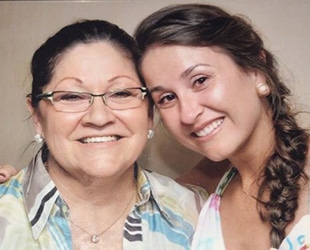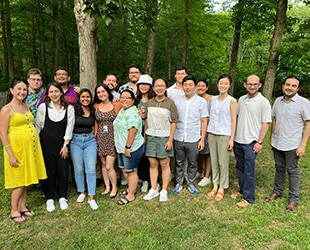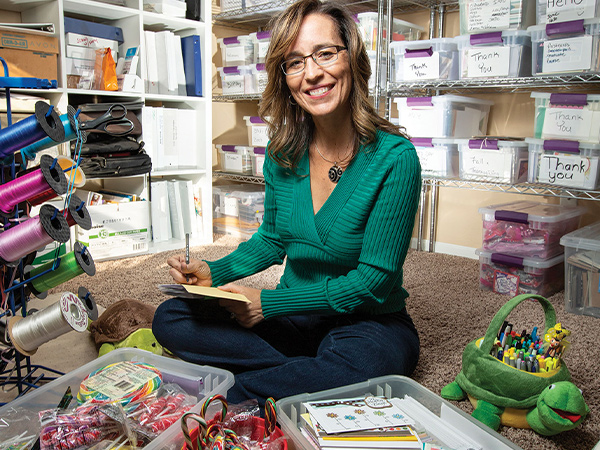Advancing Novel Pancreatic Cancer Research
A career development grant from the American Association for Cancer Research (AACR) helped Yale cancer scientist Luisa Escobar-Hoyos, MSC, PhD, earn two major, multi-year federal grants to further develop her research.
When Luisa Escobar-Hoyos, PhD, was a little girl, growing up in Colombia, her mother was a cancer scientist, and she used to tag along with her to scientific meetings including annual AACR Annual Meetings. Her mother, Luz Stella Hoyos, PhD, is a cancer researcher and professor in Colombia, and Luisa decided that cancer would be her subject, too.

(Image courtesy Dr. Luisa Escobar-Hoyos)
The wide-eyed seven-year-old is now an assistant professor at Yale University School of Medicine with her own laboratory devoted to two of the biggest cancer killers – cancers of the pancreas and the lungs – and especially their tendency to develop resistance to promising therapies.
Dr. Escobar-Hoyos is studying the problem of cancer cells developing therapy resistance by investigating a cellular process known as alternative RNA splicing, which allows cells to produce more than one protein from a single gene.
“Tumor cells hijack this pathway first to transform from normal to malignant cells,” she explained, “and then to become resistant to the therapies that we give them, for example, chemotherapy or targeted therapies, which helps them quickly rewire and overcome the perturbation” of the therapy.
“We think now that we have identified a core pathway, that we can actually start understanding, but also targeting it in many different ways to tackle this dependency of cancer cells,” she added.

Her lab has developed a therapy to correct alternative RNA splicing errors. Called Splicing-Hit Oligonucleotide Therapy (SHOT), it has shown encouraging impact in laboratory mice. And Dr. Escobar-Hoyos hopes to move it to clinical trials soon.
The AACR supported her work through the 2021 AACR Career Development Award to Further Diversity, Equity, and Inclusion in Pancreatic Cancer Research. Dr. Escobar-Hoyos credits the AACR grant support with helping her secure two major, multi-year grants from the National Cancer Institute and the National Institutes of health.
“Career development awards are very important,” she said. “When we start as junior PIs [principal investigators], we are really trying to break through with new ideas and approaches. Sometimes we don’t have all the preliminary data necessary to apply for government funding. But career development awards that support new ideas get us the first funding so that we can start producing all that data that later we can ramp up to advance our careers.”
“So I really see it as an important stepping stone into making a change in the way that we approach science and also getting that original funding that is the seed before we can actually start growing and producing data that later goes into larger grants,” she said.
Indeed, since receiving her AACR career development grant, Escobar-Hoyos earned a New Innovator Award from the National Institutes of Health, which recognizes unusually innovative work by early-career researchers, as well as her first RO1 grant from the National Cancer Institute.
Dr. Escobar-Hoyos received her bachelor’s and master’s degrees in Colombia and came to the United States on a Fulbright scholarship to obtain her doctorate in molecular and cellular pharmacology at Stony Brook University in New York. After postdoctoral work at Memorial Sloan Kettering Cancer Center, she joined Yale’s department of therapeutic radiology and department of molecular biophysics and biochemistry, as well as the Yale Cancer Center.
Through the Fulbright program, Escobar-Hoyos met her husband, J. Nicolas Hernandez-Aguilera, an economist who is now a research scientist at the Yale School of the Environment. They have two children.
“I love my career, but I also want a family, and I don’t think you should give up on either one of them,” she said.
Dr. Escobar-Hoyos said she hopes to be a role model for other women the way her mother was for her.
“I am excited to be part of this community, to have now a stronger voice as a scientist, to make a bigger impact on the new generation of scientists, to be a role model for women in science,” she said. “I get asked many times, how do you do it as a woman, as a new mom, pregnant with a new baby? And I always say it’s a matter of being motivated, but it’s also a matter of being organized. And I think you can do it all.”

